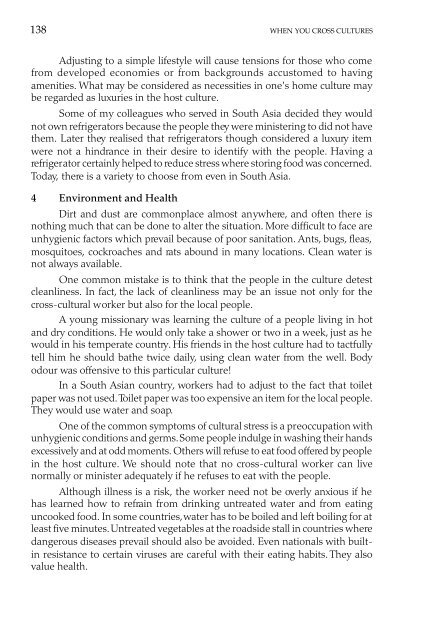WHEN YOU CROSS CULTURES - World Evangelical Alliance
WHEN YOU CROSS CULTURES - World Evangelical Alliance
WHEN YOU CROSS CULTURES - World Evangelical Alliance
You also want an ePaper? Increase the reach of your titles
YUMPU automatically turns print PDFs into web optimized ePapers that Google loves.
138 <strong>WHEN</strong> <strong>YOU</strong> <strong>CROSS</strong> <strong>CULTURES</strong><br />
Adjusting to a simple lifestyle will cause tensions for those who come<br />
from developed economies or from backgrounds accustomed to having<br />
amenities. What may be considered as necessities in one's home culture may<br />
be regarded as luxuries in the host culture.<br />
Some of my colleagues who served in South Asia decided they would<br />
not own refrigerators because the people they were ministering to did not have<br />
them. Later they realised that refrigerators though considered a luxury item<br />
were not a hindrance in their desire to identify with the people. Having a<br />
refrigerator certainly helped to reduce stress where storing food was concerned.<br />
Today, there is a variety to choose from even in South Asia.<br />
4 Environment and Health<br />
Dirt and dust are commonplace almost anywhere, and often there is<br />
nothing much that can be done to alter the situation. More difficult to face are<br />
unhygienic factors which prevail because of poor sanitation. Ants, bugs, fleas,<br />
mosquitoes, cockroaches and rats abound in many locations. Clean water is<br />
not always available.<br />
One common mistake is to think that the people in the culture detest<br />
cleanliness. In fact, the lack of cleanliness may be an issue not only for the<br />
cross-cultural worker but also for the local people.<br />
A young missionary was learning the culture of a people living in hot<br />
and dry conditions. He would only take a shower or two in a week, just as he<br />
would in his temperate country. His friends in the host culture had to tactfully<br />
tell him he should bathe twice daily, using clean water from the well. Body<br />
odour was offensive to this particular culture!<br />
In a South Asian country, workers had to adjust to the fact that toilet<br />
paper was not used. Toilet paper was too expensive an item for the local people.<br />
They would use water and soap.<br />
One of the common symptoms of cultural stress is a preoccupation with<br />
unhygienic conditions and germs. Some people indulge in washing their hands<br />
excessively and at odd moments. Others will refuse to eat food offered by people<br />
in the host culture. We should note that no cross-cultural worker can live<br />
normally or minister adequately if he refuses to eat with the people.<br />
Although illness is a risk, the worker need not be overly anxious if he<br />
has learned how to refrain from drinking untreated water and from eating<br />
uncooked food. In some countries, water has to be boiled and left boiling for at<br />
least five minutes. Untreated vegetables at the roadside stall in countries where<br />
dangerous diseases prevail should also be avoided. Even nationals with builtin<br />
resistance to certain viruses are careful with their eating habits. They also<br />
value health.

















